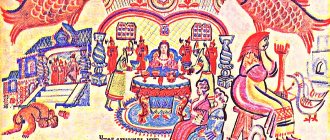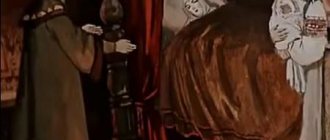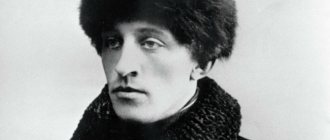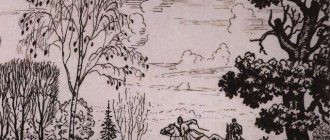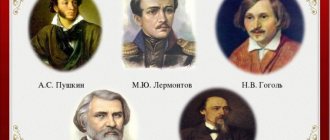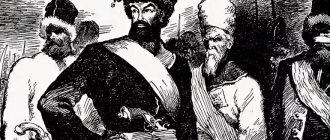The sun of Russian poetry
The sun of Russian poetry From the only notice of the death of A.S. Pushkin, which was published on January 30, 1837 in the 5th issue of “Literary Additions” - a supplement to the newspaper “Russian Invalid”.
This notice, written by the writer Vladimir Fedorovich Odoevsky (1804-1869), consisted of several lines: “The sun of our poetry has set! Pushkin died, died in the prime of his life, in the midst of his great career. We have no power to talk about this anymore, and there is no need: every Russian heart knows the full price of this irreparable loss, and every Russian heart will be torn to pieces. Pushkin! our poet! our joy, our national glory. Is it really true that we no longer have Pushkin! You can’t get used to this thought! January 29th 2:45 pm.” This obituary angered the Minister of Public Education S.S. Uvarov. The editor of “Literary Additions,” journalist A. A. Kraevskpy, was summoned to the chairman of the Censorship Committee, who informed him of the minister’s displeasure: “Why this publication about Pushkin. But what expressions! "The sun of poetry!" For mercy's sake, why such an honor? "(Russian antiquity. 1880. No. 7). It is possible that the expression “the sun of our poetry has set” was inspired by V. F. Odoevsky with another, very similar one from “The History of the Russian State” (vol. 4, chapter 2) by N. M. Karamzin. There, the historian tells how in Rus' they received the news of the death of Alexander Nevsky in 1263. Metropolitan Kirill of Kiev, “informed of the death of the Grand Duke. in the meeting of the clergy he exclaimed: “The sun of the fatherland has set.” Nobody understood this speech. The Metropolitan was silent for a long time, burst into tears and said: “Alexander is gone!” Everyone was numb with horror, because Nevsky seemed necessary for the state and, given his years, could live for a long time.” For Karamzin himself, the primary source was a monument of Russian literature of the second half. XVI century “The Degree Book”, in which for the first time in Rus' an attempt was made to collect together historical information contained in various Russian chronicles. The phrase from the “Book of Degrees” sounds like this: “The sun has already set the earth of Russia.” Encyclopedic Dictionary of winged words and expressions. — M.: “Locked-Press”. Vadim Serov. 2003.
See what “The Sun of Russian Poetry” is in other dictionaries:
the sun of our poetry - noun, number of synonyms: 3 • genius of Russian literature (3) • our everything (6) • Pushkin ... Dictionary of synonyms
THE SUN is a heavenly body, revered by the Slavs as the source of life, warmth and light. Folk ideas about the Sun and light were influenced by the church book tradition. In the ancient Russian pagan pantheon, Khors, Dazhbog and Svarog had a solar nature,... ...Russian history
The sun in mythology, ethnography, literature - in religious legends and in the poetry of ancient peoples was important; In modern folk beliefs, rituals and fairy tales, the ancient cult of the Sun is still revealed. Agricultural peoples idolized S. and represented him in anthropomorphic... ... Encyclopedic Dictionary F.A. Brockhaus and I.A. Efron
The sun, in mythology, ethnography, literature - in religious legends and in the poetry of ancient peoples, was important; In modern folk beliefs, rituals and fairy tales, the ancient cult of the Sun is still revealed. Agricultural peoples idolized S. and represented him in anthropomorphic... ... Encyclopedic Dictionary F.A. Brockhaus and I.A. Efron
Let's be like the sun. Book of symbols - Let's be like the sun. Book of Symbols ... Wikipedia
genius of Russian literature - noun, number of synonyms: 3 • our everything (6) • Pushkin (13) • the sun of our poetry (3) ... Dictionary of synonyms
Bogatyrs and knights of the Russian land - Viktor Vasnetsov. “Bogatyrs” (Dobrynya Nikitich, Ilya Muromets and Alyosha Popovich). 1881 1898. Bogatyrs and knights are artistic images of heroes who defended the lands of Kievan Rus, the Russian people from enemy invasions or from evil evil spirits, created by anonymous ... ... Wikipedia
Motifs of Lermontov's poetry - MOTIVES of Lermontov's poetry. Motive is a stable semantic element lit. text, repeated within a number of folklore (where the motif means the minimum unit of plot structure) and lit. artist prod. Motive m.b. considered in the context of all creativity... ... Lermontov Encyclopedia
Pushkin - Kukushkin, no one knows who, God knows, the sun of our poetry, the genius of Russian literature, ace Pushkin, our everything; Tsarskoe Selo Dictionary of Russian synonyms. Pushkin The Sun of Russian Poetry Dictionary of synonyms of the Russian language. Practical guide. M.:... ... Dictionary of synonyms
Dyshalenkova, Rimma Andriyanovna - Rimma Dyshalenkova photo 2006. Birth name: Rimma Andriya ... Wikipedia
Source
To mainThe sun of Russian poetry.
A figurative definition of the meaning of the great Russian poet A. S. Pushkin. This expression is from a short notice of the poet’s death, published on January 30, 1837 in No. 5 of “Literary Additions to the Russian Invalid”: “The sun of our poetry has set! Pushkin died, died in the prime of his life, in the midst of his great career!.. We have no power to talk about this anymore, and there is no need; every Russian heart knows the full price of this irreparable loss, and every Russian heart will be torn to pieces. Pushkin! our poet! our joy, our national glory!.. Is it really true that we no longer have Pushkin! You can’t get used to this thought! January 29th 2:45 pm.” The author of this notice was considered to be journalist A. A. Kraevsky, editor of Literary Additions. However, from S. N. Karamzina’s letter to her brother, published in 1956, it is clear that in fact the author of this notice is V. F. Odoevsky (1804-1869) (I. Andronikov, Tagil Nakhodka, “New World, 1956, No. 1). This brief notice aroused the anger of the Minister of Public Education S.S. Uvarov. Kraevsky was summoned to the chairman of the censorship committee, who informed him of the minister’s displeasure: “Why this publication about Pushkin?.. But what kind of expressions! "The sun of poetry!" For mercy, why such an honor?..” (“Russian Antiquity”, 1880, No. 7, pp. 536-537.) The expression, which frightened the dignitaries of Nicholas Russia, was firmly entrenched in our speech. It is interesting to note that an expression similar in thought was given by N.M. Karamzin in “History of the Russian State” (vol. IV, chapter 2). When Alexander Nevsky died in 1263, Metropolitan Kirill of Kiev, “having learned of the death of the Grand Duke... in a meeting of the clergy exclaimed: “The sun of the fatherland has set.” Nobody understood this speech. The Metropolitan was silent for a long time, burst into tears and said: “Alexander is gone!” Everyone was numb with horror, because Nevsky seemed necessary for the state and, given his years, could live for a long time.” Karamzin’s source was the “State Book,” a monument of the second half of the 16th century, the first attempt at summarizing historical information reported by chronicles and chronographs. In the “Degree Book,” this phrase reads like this: “The sun has already set in, the land of Russia” (The Degree Book, eighth degree. Poly, collection of Russian chronicles, St. Petersburg, 1908, vol. XXI, 1, p. 293).
The founder of our literature, the sun of Russian poetry, the immortal Pushkin dreamed of publishing a newspaper in which he could speak to the people (“Day of the Bolshevik Press,” Lit. Gaz., May 4, 1949).
Pushkin is the favorite writer of our time. The entire progressive world, together with us, celebrates today 160 years since the day when the “sun of Russian poetry” rose (O. Peskov, The edges of Moscow, the native lands... “Evening Moscow”, June 6, 1959).
Previous page
| to the list of wordsto the beginning of the dictionary | Next page |
The sun of Russian poetry and Our everything. Contexts
There are at least two stable phrases in the Russian language, born back in the nineteenth century and clearly indicating the place that the people determined for Pushkin through the mouths of their best people.
One of these phrases - the Sun of Russian poetry - appeared in tragic circumstances, the day after the death of the Poet, in the “Literary Additions to the Russian Invalid” (“Russian Invalid”, the official newspaper of the Military Ministry published in those days in St. Petersburg).
The context in which this expression arose was, in a sense, a death notice. This is what it looked like, this notice: “The sun of Russian poetry has set! Pushkin died, died in the prime of his life, in the midst of his great career. We have no power to talk about this anymore, and there is no need: every Russian heart knows the full price of this irreparable loss, and every Russian heart will be torn to pieces. Pushkin! Our poet! Our joy, our national glory. Is it really true that we no longer have Pushkin! You can’t get used to this thought! January 29, 2:45 pm.”
The notice was not signed; its author was traditionally considered to be the editor of Literary Additions, Andrei Aleksandrovich Kraevsky. The notice aroused the anger of the Minister of Public Education S.S. Uvarov. Kraevsky was summoned to the chairman of the St. Petersburg Censorship Committee, who conveyed to him the minister’s dissatisfaction: “Why this publication about Pushkin. But what expressions! “The sun of poetry!” For mercy, why such an honor. »
Development of the lesson “The Sun of Russian Poetry.” lesson plan (grade 5) on the topic
Teacher of Russian language and literature, Tatyana Ivanovna Dyachkova, GBOU school No. 217"The Sun of Russian Poetry." Pushkin and his influence on the development of Russian culture
The article belongs to the section: Teaching literature
Purpose of the lesson: to introduce students to Pushkin, to show that Pushkin’s work inspired poets, musicians and artists
Equipment:
- exhibition of books by A.S. Pushkin and about Pushkin,
- paintings by various artists depicting the poet,
- CDs with recordings of romances based on poems by A.S. Pushkin,
- music for Pushkin's works,
- illustrations for the poet's works.
No, all of me will not die - the soul in the treasured lyre will survive my ashes and decay will flee - And I will be glorious as long as at least one drinker is alive in the sublunary world.
A.S. Pushkin “Monument”.
During the classes
1. Introductory speech by the teacher.
Today we will talk about the influence that the work of A.S. Pushkin had on Russian culture. The poet gave impetus to the development of literature about himself, artists and composers considered it an honor to create works based on his subjects, and his contemporaries considered it their duty to leave their memories. And now there is a real Pushkiniana, both poetic and musical. In our lesson we will get acquainted with a small part of these works. But first, let's talk about when and how this figurative definition of the great Russian poet appeared - the Sun of Russian poetry.
Student. This expression first appeared in a short notice of the poet’s death, published on January 30, 1837 in No. 5 of “Literary Additions to the Russian Invalid”: “The sun of Russian poetry has set! Pushkin died, died in the prime of his life, in the middle of his great career!.. We have no strength to talk about this anymore, and there is no need: every Russian heart knows the full price of this irreparable loss, and every Russian heart will be torn to pieces. Pushkin! Our poet! Our joy! Our national glory! Is it really true that we no longer have Pushkin! You can't get used to this thought! January 29, 2:45 pm.”
The author of this notice was considered to be journalist A.A. Kraevsky, editor of “Literary Additions”, but later a letter from S.N. was found. Karamzina to her brother, from which it is clear that the author of this notice was V.F. Odoevsky. This brief notice angered the Minister of Public Education S.S. Uvarov. Kraevsky was summoned to the chairman of the censorship committee, who informed him of the minister’s displeasure: “Why this publication about Pushkin?.. But what kind of expressions are these! “The sun of poetry!” For mercy, what is such an honor for?..” The expression, which frightened the dignitaries of Nicholas Russia, has become firmly established in our speech.\ It is interesting to note that an expression similar in thought was given by N.M. Karamzin in “History of the Russian State” (vol. 4, chapter 2). When in 1263 Alexander Nevsky died, Metropolitan Kirill of Kiev, “having learned about the death of the Grand Duke... in a meeting of the clergy he exclaimed: “The sun of the fatherland has set.” This is what I learned from N.S.’s dictionary. Ashukin and M.G. Ashukina “Winged words”.
Pupil. I want to add a little. I first heard this figurative expression in 5th grade. It surprised me very much: how can a person be compared to the sun? But as I got older, I realized how true and accurate this is. Like the sun, Pushkin’s poetry shines above us in its unattainability, its warm rays warm us, we always remember individual lines. In winter, looking out the window and seeing a beautiful morning, we will definitely remember: “Frost and sun! Wonderful day!” Entering the autumn forest, we will certainly say: “Sad time, the charm of the eyes!” Your farewell beauty is pleasant to me.” Like the sun, Pushkin's poetry does not age. And I read one more thing: it turns out that at the same time as Pushkin, other Russian poets lived and created their works. It seemed to me that there was only Pushkin. So I thought: “Just as the sun outshines the stars during the day, so does the talent and genius of A.S. Pushkin eclipsed all other poets who received the modest name: Poets of Pushkin's time.
2. Work on the topic of the lesson.
Teacher. This is some interesting material Alyosha and Lena found and told us. Now let's move on to the next part of our lesson. Look around the stands and you will see many reproductions by different artists. But let’s give the floor to the art history group and listen to what the guys in this group managed to find out.
Pupil. Since there was a lot of material, we decided to divide into three groups: the first will talk about portraits of Pushkin, painted by different artists at different times, the second will talk about monuments to the poet installed in different parts of the world, and the third will talk about a unique collection of artistic miniatures - bookplates .
I'll start first. For our mini-exhibition, I selected several reproductions of paintings by Russian artists. The first of them is “Pushkin at the Lyceum Exam” by I.E. Repin, written in 1911. A well-known episode from the life of a young lyceum poet is depicted here. January 8, 1815. The oldest and most famous poet of that time, Gabriel Romanovich Derzhavin, came to the Lyceum for the exam. Without looking up, he looks at the curly-haired teenager, who, with his hand raised high, enthusiastically and selflessly recites the poems he composed for the special occasion.
Tears of delight flow down wrinkled cheeks, the face is illuminated by the reflection of suddenly returned youth. Let us also listen to what excited Derzhavin so much (an excerpt from Pushkin’s poem “Memoirs in Tsarskoe Selo” is heard).
Painting by artist N.N. Ge “Pushchin visiting Pushkin in Mikhailovsky” was written in 1893.
This is a new stage in the life of Alexander Sergeevich. The loneliness of the disgraced poet is brightened up only by the old nanny. Unexpectedly, I.I.Pushchin’s best friend arrives. It is about this meeting in 1825 that the following lines will be written:
And now here, in this forgotten wilderness, In the abode of desert blizzards and cold, a sweet consolation was prepared for me: ……………………………………………………………….. ………………The poet’s disgraced house , Oh my Pushchin, you were the first to visit; You sweetened the sad day of exile, You turned it into the day of the Lyceum.
Pushchin brought the comedy “Woe from Wit” by A.S. as a gift to Pushkin. Griboedova. The moment of reading a comedy that was previously completely unfamiliar to the poet was depicted by the artist Ge. And later, in 1828, in Chita, from the hands of A.G. Muravyova Pushchin will receive a piece of paper on which it was written:
My first friend, my priceless friend! And I blessed fate, When my secluded yard, covered with sad snow, Your bell rang.
I pray to holy providence: May my voice grant your soul the same consolation, May it illuminate the imprisonment with the Ray of clear lyceum days.
This poem was a huge support for Pushchin; Pushkin’s voice echoed in Pushchin’s soul with deep, life-giving gratitude.
The following reproduction is a lifetime portrait of A.S. Pushkin, written in 1827 by V.A. Tropinin. This is how we imagine the poet, because this is the portrait that is published most often. The poet’s gaze is directed to the side, a deep thought slides across his face, another moment... and “fingers ask for pen, pen for paper” - a new poetic masterpiece will appear to the world.
Pay attention to the neckerchief. Since the time of Pushkin, it has become a sign of a romantic style of clothing and a distinctive feature of creative people. The poet's hand with a ring on his finger attracts our attention. This was a gift from Countess E. Vorontsova, Pushkin never parted with it, considered it his talisman and dedicated the wonderful poem “Talisman” (the poem “Talisman” sounds).
Now let's look at the following reproduction from the painting by N.P. Ulyanov “A.S. Pushkin with his wife at a court ball,” written in 1936. The poet lives the best and most difficult time of his life: he loves his beautiful wife and at the same time is an object of intrigue and gossip. The artist constructed the image in the painting in an interesting way: only two people are actually present, but in the mirror reflection we see a whole group of people standing on the main staircase. Natalya Nikolaevna preens herself before the ball, looks in the mirror, and we admire the wondrous beauty of this woman, and the lines dedicated to her come to mind:
My wishes came true. The Creator sent you to me, my Madonna, the purest example of purest beauty.
Natalya Nikolaevna’s face is calm and serene: she is in anticipation of fun and success.
Pushkin is depicted in a form that is unusual for us: he is in uniform. This was the only way to attend a court ball. The poet looked around sharply. He casts a piercing glance at one of his ill-wishers. The nobles standing on the stairs unceremoniously examine the Pushkins.
And the last reproduction. Artist A.A. Naumov “Pushkin’s Duel with Dantes”, 1885. Danzas and D. Ashirak raised the wounded poet from the ground. The coachman brings the sleigh closer to the place of the duel in order to put Alexander Sergeevich in it. On the bloody snow lie the poles of a dismantled fence that was in the way of the sleigh, a dueling pistol, and the poet’s clothes. Pushkin’s seconds look after Dantes with reproach and hatred. Does he understand what just happened? Does he fully understand what he raised his hand to? It's hard to say for sure. But from Dantes’s later life it is known that he will never be able to forget this.
And for Pushkin, time began to count down the last days and hours of his life, so that after that he could begin counting down the centuries of immortality.
Student. I will talk about the monuments to A.S. Pushkin, and I’ll show you a few illustrations.
Already in the first years after the tragic death of the poet, the progressive public of Russia began the thorny path of petitions to the authorities to perpetuate the name and deeds of Pushkin through monumental art. And only in November 1860, Tsar Alexander 1 allowed popular subscription. The treasury was not generous with a single penny. The dignitary Petersburg did not find a place for the monument to Pushkin - the best areas were occupied by crowned persons.
It was decided to erect a monument in Moscow, the poet’s homeland. After three competitions, the sculptor A.M. won. Opekushin, the son of a serf and himself a former serf from the Yaroslavl province.
And on June 6, 1880, the people and prominent figures of Russian literature gathered at the opening of the monument to Pushkin and read, mutilated by censorship and replaced with original Pushkin words only in 1937:
I have erected a monument to myself, not made by hands; the people’s path to it will not be overgrown.
The bronze figure on Tverskoy Boulevard was the first in the world. Look at the illustration. The pensive poet took a step and, it seemed, in just a moment he would leave the pedestal. Now this is a favorite place for Muscovites to make dates. And on the poet’s birthday, it is always crowded here, poems are sung, and a new generation comprehends Pushkin.
In Soviet times, the poet's surname was included in the list of persons whose name should be immortalized first. The first Soviet monuments were made, as a rule, in plaster, clay, cement and did not last long. It took a lot of time for them to be replaced by monuments made of cast iron, marble, granite, and bronze.
In 1937, on the 100th anniversary of the poet’s death, places associated with the poet’s life were marked in several cities and villages. An obelisk appeared near the Black River in Leningrad at the site of the duel, and a bust appeared in the village of Kamenka in Ukraine at Davydov’s estate, where the poet met with the Decembrists.
In the same year, in Armenia, at the pass where Pushkin met a peasant cart with the coffin of A.S. Griboedov, who was killed in Tehran, a memorial spring was built to immortalize the tragically significant meeting of two great poets in 1829. A similar spring - they have been built by the Armenian people for a long time - was opened in 1977 in Leninokan. On the monument erected in Odessa there is a modest inscription: “From the residents of Odessa.”
In 1937, a bust of Pushkin was erected in Shanghai, China. Unfortunately, it was destroyed during the Cultural Revolution. There is a bust of the poet in Weimar (Germany) - the city of Goethe and Schiller.
In 1970, a bust of Pushkin, made by Ukrainian sculptors Kovalev and Boroday, was presented to New York as a gift. The poet stands as if alive in one of the squares of the capital of Romania, Bucharest.
There is a monument to Pushkin on Voronezh soil: in 1947, the residents of Rossosh erected a plaster bust on a high pedestal on Karl Liebknecht Street. And for the 200th anniversary of the poet, we installed a memorial sign in Novovoronezh - the Rotunda, reminding us that the poet passed through our land on his way to the south. Here was the road to the crossing of the Don.
Years pass. New monuments to the poet are growing, which testifies to the unfading love for the great A.S. Pushkin.
Teacher. Thanks guys. I want to add a little. This year I was in Odessa and was surprised and happy to discover that a new monument to Pushkin had appeared in the city. It stands right on the sidewalk opposite the house where the poet lived. It seems that Alexander Sergeevich left the house and stopped for a second, wondering which way to go. Look at the photo I have. The figure of Pushkin is in full height, with a top hat on his head, and dressed in a frock coat. You can take a poet by the arm, which is what I did, and now, like Gogol’s Khlestakov, I can say that I am on friendly terms with Pushkin.
Now let's listen to the story about the exhibition of bookplates.
Pupil. First I will tell you what a bookplate is. The Dictionary of Foreign Words says the following:
“A book sign (an artistically executed label, a vignette with the name of the owner of the book or a symbolic design), pasted on the inside of the binding or cover.”
This exhibition took place at the Moscow Education Center and was called “Pushkin in the Bookplate.”
The compiler of the exhibition is the author of the book with the same title, E.P. Zharnitsky.
The Pushkin theme in the bookplate is relatively young. The first book sign dedicated to the poet was made in the 80s by the Parisian engraver E. Pesky based on a drawing by I.O. Mikishin for the library of the Pushkin writer A.Yu. Onegin. It depicts Tatiana writing the initials on the frosty window... Onegin, but not the “cherished monogram E and. O ”, and the initials of the owner of the book. We took several bookplates from the magazine “National Education” No. 5, 2004. today we show you.
Here Arina Rodionovna listens to the poems of her pet. It’s dark outside the window, a candle is burning. This is a book sign from Ya.I. Berdichevsky. Book sign of bibliophile V.Ya. Bialy portrays Pushkin on a walk
N. Rerberg drew Tatyana reading Onegin’s letter for Nina Vogau. For books by Pushkinist
S.S. Geichenko created a bookplate, where the poet lies thoughtfully on the grass, admiring the nature of the Pskov region. And the last one is dedicated to the memory of the talented young artist Nadya Rusheva. She was very fond of Pushkin’s work and made many drawings with pen and ink. Nadya passed away
18 years old, but the family kept their daughter’s work. The bookplate of the Rushev family was created based on her drawings: lyceum student Pushkin and Natalie. To the artist V.N. Kedrin managed to catch the flying style of Nadya’s drawings and repeat it in the bookplate.
135 works were presented at the exhibition.
3. In the next part of the lesson we will listen to poems dedicated to Pushkin.
It must be said that every poet feels like a student of Pushkin and considers it necessary to write several poems about him, therefore the poetic Pushkiniana is very great. The very first was M.Yu. Lermontov’s poem “The Death of a Poet,” which became a tragic hymn to the memory of Pushkin.
(This poem sounds, as well as S. Yesenin, A. Akhmatova and other poets).
Mark Lisyansky.
First love.
In the Lyceum garden the wind rules, A yellow maple leaf has fallen to the window. And Katenka Bakunina walks like a princess through Tsarskoe Selo.
She walks easily, leisurely, And a stern gaze, and an inaccessible view From the windows, everyone looks at this miracle, And Sasha Pushkin looks longer than anyone.
The booming voice of blood does not stop, Pushkin does not know that in the world there is the same woman who is equal to the poet’s love. But he is a poet!
Then the poems will come, like an obsession, And he will write - “Tears” and “Window”, And “Testament”, and Pleasure”, and “To Her” and “To the Painter” at the same time.
Gorgeous. Artist. All in the dark Against the background of flaming foliage, She walked by in a rebellious impulse, Without turning her arrogant head.
And he leaned against the window, stood there, not breathing. Let the winds sweep the trail with leaves... That
He will write down the day in his diary, That he was happy for five whole minutes.
Vera Inber.
The sun of Russian poetry
"The Sun of Russian Poetry"
- in Russian, a figurative definition (periphrase) of the historical and literary place occupied by the poet Alexander Pushkin. [2]
The expression first appeared in a short note about the death of A.S. Pushkin, published in “Literary Additions to the Russian Invalid” on February 11, 1837, the day after the poet’s death. The information notice had no signature. For this reason, the authorship of the expression is most often attributed to A.A. Kraevsky (as the editor of “Literary Additions”, who took responsibility) or V.F. Odoevsky. [3] Regardless of the final authorship, the original source for both was most likely a similar phrase from the fourth volume of “History of the Russian State” by Nikolai Karamzin.
Primary sources [edit]
Alexander, already in poor health, returned to Nizhny Novgorod and, having arrived from there to Gorodets, fell ill with a serious illness that ended his life on November 14. Having exhausted his mental and physical strength in zealous service to his fatherland, before his end he thought only about God: he took monastic vows, took the schema and, hearing the sorrowful crying around him, in a quiet voice, but still with an expression of tender sensitivity, said to his good servants: “Go away and do not crush your souls.” my pity! They were all ready to go to the grave with him, having always loved him - in the own words of one of them - much more than their own father. Metropolitan Kirill then lived in Vladimir: having learned about the death of the Grand Duke, he exclaimed in a meeting of the clergy: “The sun of the fatherland has set!” Nobody understood this speech. The Metropolitan was silent for a long time, burst into tears and said: “Alexander is gone!” Everyone was numb with horror: for Nevsky seemed necessary for the state and, given his years, could live for a long time. [4]
| — Nikolai Karamzin, “History of the Russian State” (volume four), 1810 |
